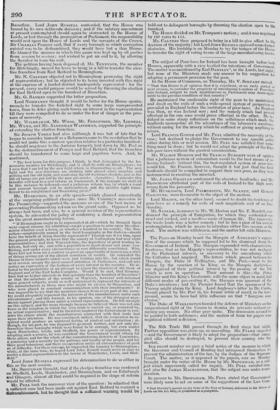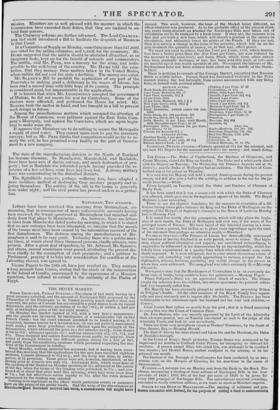The Silk Trade Bill passed through its final stage last
night. Further opposition was given up, as unavailing. Mr. FYLER suggested —and the Government is likely to adopt the proposition—that smuggled silks should be destroyed, to prevent their coming into the market.
In a recent number we gave a brief notice of the manner in which the Governor and Council of Bombay had interposed themselves to prevent the administration of the law, by the Judges of the Supreme Court. The matter, as it appeared in the papers, was on Monday brought under the notice of the House by Mr. BROUGHAM, as a subject which imperiously called for inquhy. Mr. PEEL satisfied inn!, and also Sir JAMES MACKINTOSH, that the subject was under consideration.
In answer to Mr. BROUGHAM, Mr. PEEL stated that Government were likely soon to act on some of the suggestions of the Law Coin * Earl Darnley's speech on the State of the Poor of Ireland, delivered in the House of Lords on the Ist. May, is puhlished as a pamphlet. mission. Ministers are so well pleased with the manner in which the Commission have executed their duties, that they are inclined to extend their powers. The Chancery reforms are farther advanced. The Lord CHANCELLOR last night introduced a Bill to facilitate the despatch of Business in that Court. In a Committee of Supply on Monday, something more than 247,0001. was voted for the militia estimates, and 1,483/. for the yeomanry. Mn flustu suggested that the militia should be abolished altogether, as an imaginary body, kept up for the benefit of colonels and commanders. The militia, said Mr. PEEL, was a nursery for the army, and indispensible to the well-being of the country. Mr. HUME told the committee, that they manage these matters better in the United States, whose militia did not cost the state a farthing. The money was voted. Mr. SLANEY'S Bill to prohibit the application of any part of the Poor-rates to making good a deficiency in the wages of labour, has been read a second time with little hope of its passing. The principle is considered good, but impracticable in the application. It is known that when Mr. LUSHINGTON accepted the government of Madras, he did not vacate his seat for Canterbury. Some of the electors were offended, and petitioned the House for relief. Mr. BARING took the matter in hand, and has brought in a bill to prevent such doings in future. Among the miscellaneous matters which occupied the attention of the House of Commons, were petitions against the East India Company's Monopoly, and against the Corn-laws, Which are again beginning to make some stir. It appears that Ministers are to do nothing to secure the Metropolis a supply of good water. They cannot spare cash to pay the necessary surveys; but as Mr. PEEL thinks that competition would go far to remedy the evil, he has promised every facility on the part of Government to a new company.



















 Previous page
Previous page